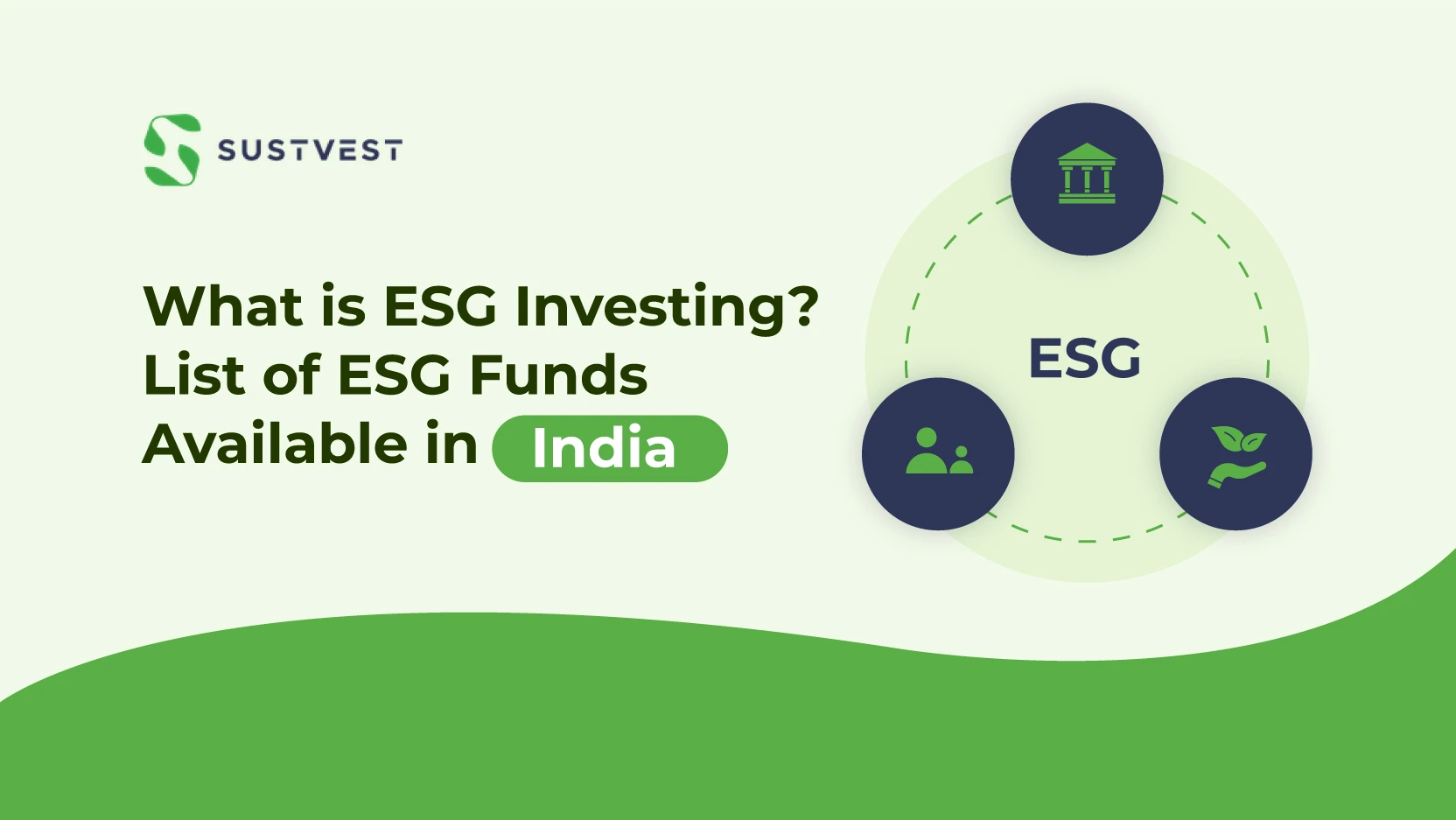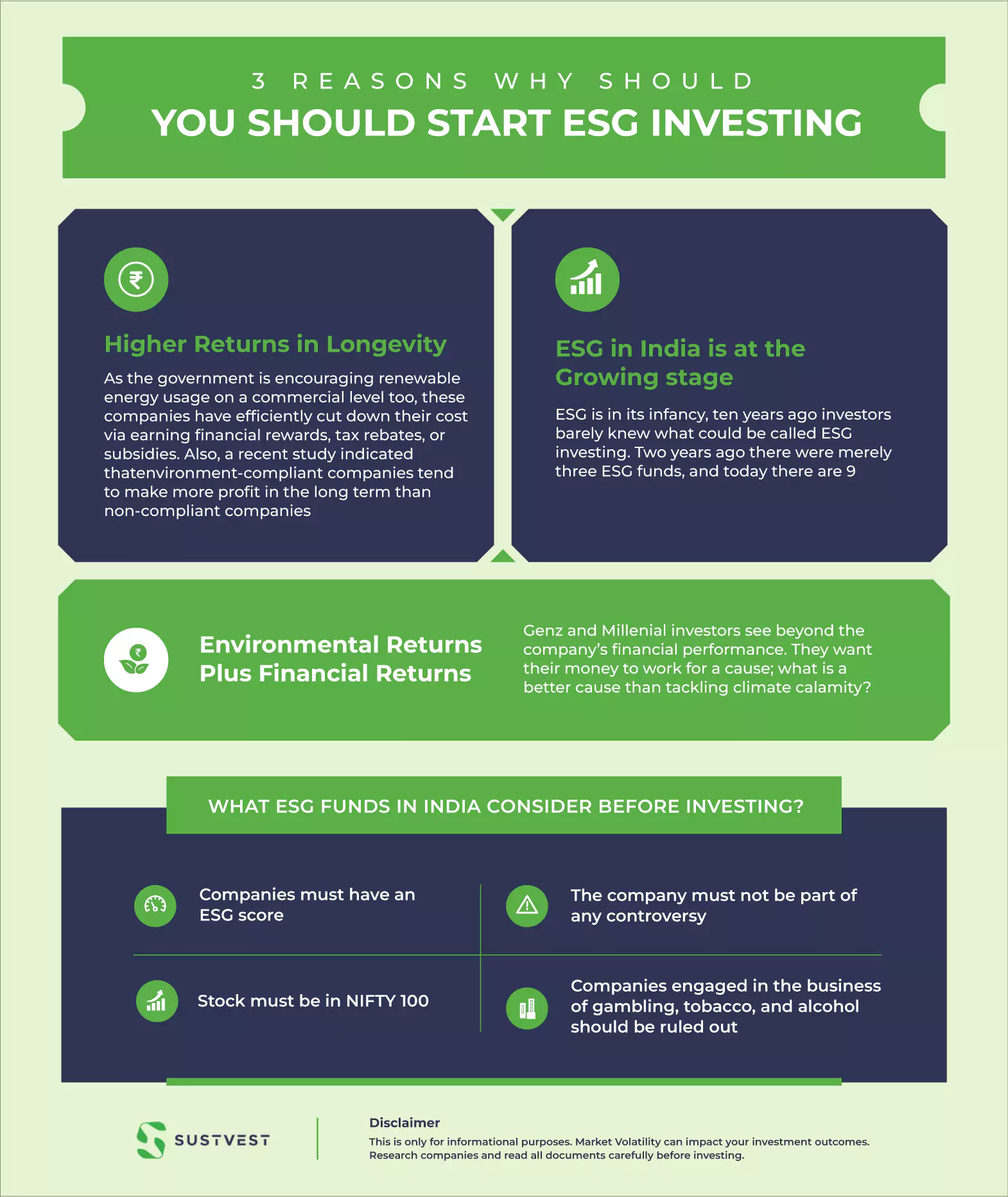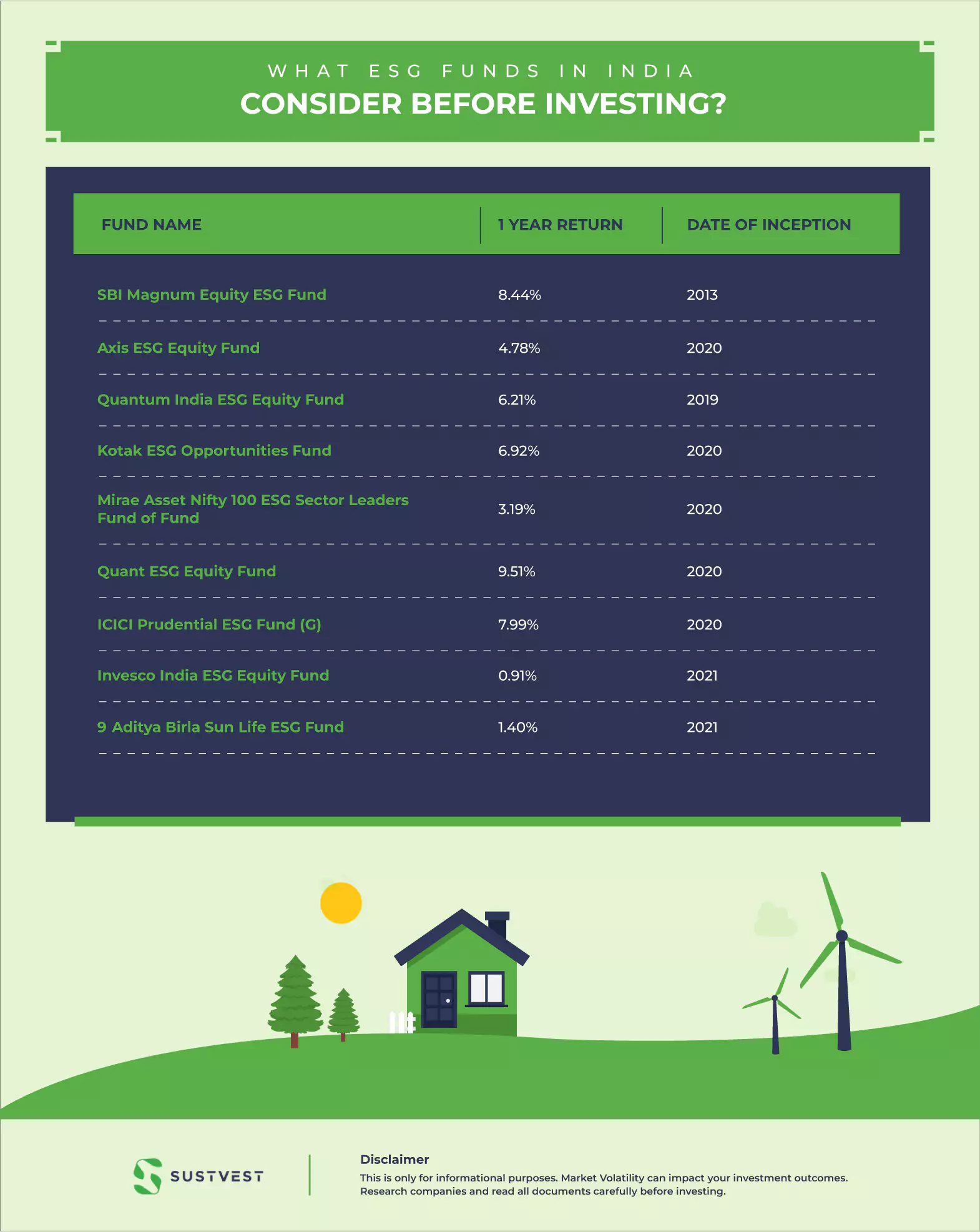More and more people are becoming conscious of their choices, whether transitioning to eco-friendly products from single-use products and adopting sustainable fashion practices rather than buying a dress moment it is seen, or taking part in green investment rather than relying on conventional investment alternatives.
If you have just started your investing journey and feel a little overwhelmed about choosing from too many options, We introduce you to an instrument that not only gives you returns but also gives you the sense of making a positive difference in the quest of combating climate change.
You might have heard the term “what is ESG investing” thrown around amongst seasoned investors lately. But let’s explore what is ESG investing, why you should consider investing in it, and which ESG funds and their returns. Additionally, we’ll discuss the controversy surrounding greenwashing. And how you can take informed financial decisions despite it.
Let’s dive into what many believe is the future of sustainable finance with an understanding of what is ESG investing.

So, What Is ESG Investing?
Rather than only focusing on profits as the sole reason to invest, the question What is ESG investing also focuses on non-financial factors like sustainability, inclusiveness, and fairness in the company’s practices.
The textbook answer for what is ESG investing would be investing in ESG-compliant companies that prioritize ethical practice while making profits. Understanding each letter of ESG is of utmost importance to grasp the essence of What is ESG investing in India.
The ‘E’ in ESG stands for environmental considerations for adopting end-to-end sustainable practices throughout a product’s lifecycle, from production and operation to marketing and disposal.
Taking care of the environment includes managing carbon emissions, minimizing ground pollution, practicing proper waste management, energy usage, promoting recycling, utilizing green transportation vehicles, and considering the impact on wildlife.
The S in ESG stands for the company’s Social responsibilities towards its stakeholders, such as employees, customers, suppliers, and broader audience.
This includes ensuring employee welfare, equality and diversity, healthcare, human rights, vendor relationship, and more.
The G stands for corporate governance, which involves addressing issues like shareholder rights, health and safety, legal practices, and business ethics.
However, the deep understanding starts with distinguishing each type of sustainable investing and knowing the Key Differences Between Impact Investing, ESG, and SRI.
What is ESG Score?
After getting to know what is ESG investing, Let’s understand what ESG score is.
ESG score is like a credit rating, but it only rates a company’s ethical performance based on environmental, social, and governance practices. Even though the government does not issue such ratings, many private agencies do.
Incorporating ESG scores in investment decisions is not common in traditional investments. So, what is ESG investing? It is a form of investment that considers environmental, social, and governance factors when evaluating companies.
A higher ESG score suggests the company has good ethical practices across all three factors. In contrast, a lower score indicates that the company is not prioritizing the creation of a sustainable future through adherence to ESG metrics.
It goes without saying that companies with lower ESG scores may be at risk for losses in the future due to the adverse effects of climate change.
3 Reasons Why Should You Should Start ESG Investing
Higher Returns in Longevity
As the government is encouraging renewable energy usage on a commercial level too, these companies have efficiently cut down their cost via earning financial rewards, tax rebates, or subsidies. Also, a recent study indicated that environment-compliant companies tend to make more profit in the long term than non-compliant companies.
ESG in India is at the Growing stage
ESG is in its infancy, ten years ago investors barely knew what could be called ESG investing. Two years ago there were merely three ESG funds, and today there are 9. Moreover, Post Covid, ESG investing has taken a sharp high as an institutional investment in ESG funds touched a whopping $7.9 billion in 2022.
Environmental Returns Plus Financial Returns
Genz and Millenial investors see beyond the company’s financial performance. They want their money to work for a cause; what is a better cause than tackling climate calamity?
It’s a myth that sticking to ethical principles won’t earn business profits. The fact that will shock you to the core is that ESG indexes have performed better than Nifty Indexes in the past few years.

What is ESG Investing: ESG Funds
ESG funds are mutual funds that fall under sustainable investing, impact investing, or responsible investing.
These funds invest in stocks or bonds of companies that follow ESG (environmental, social, and governance) parameters, which are non-financial factors that measure the company’s impact on the environment and society and its corporate governance practices.
ESG fund manager prioritizes the companies that score higher in their ESG parameters, then look into financial returns before making an informed decision.
What is ESG Investing: The Evolution of ESG Funds in India
If you had asked for the names of ESG Funds 10 years ago, the list would have been blank.
It all began with SBI’s decision to reposition its SBI Magnum Equity ESG Fund in 2018, originally starting in 2013. Around 2020, more than five fund houses followed suit and launched their ESG funds.
All this race let SEBI act fast and have companies publish their annual Business Responsibility and Sustainability Reports mandatory from 2023; until then companies didn’t need to publish the BRSR report in their annual report.
Global investors, institutional investors, and high-net-worth individuals investing in ESG funds making a way easier for retail investors too. In the Indian context, it is equally important to know if ESG investing is applicable in India and how ESG investing in India works.
What ESG Funds in India Consider Before Investing?
ESG funds in India use NIFTY 100 ESG TRI as their benchmark. Not just the financial performance of this stock weighs in, but most fund managers prioritize their ESG scores. To be considered in the ESG funds list, the store has to tick the following boxes.
- Companies must have an ESG score
- Stock must be in NIFTY 100
- The company must not be part of any controversy
- Companies engaged in the business of gambling, tobacco, and alcohol should be ruled out
Based on these criteria, as of now, in India, there are 9 ESG funds. Now that we have a clear idea of what is ESG investing, let’s check each with their returns of one year and the date of inception.
| No | Fund Name | 1 Year Return | Date of Inception |
| 1 | SBI Magnum Equity ESG Fund | 8.44% | 2013 |
| 2 | Axis ESG Equity Fund | 4.78% | 2020 |
| 3 | Quantum India ESG Equity Fund | 6.21% | 2019 |
| 4 | Kotak ESG Opportunities Fund | 6.92% | 2020 |
| 5 | Mirae Asset Nifty 100 ESG Sector Leaders Fund of Fund | 3.19% | 2020 |
| 6 | Quant ESG Equity Fund | 9.51% | 2020 |
| 7 | ICICI Prudential ESG Fund (G) | 7.99% | 2020 |
| 8 | Invesco India ESG Equity Fund | 0.91% | 2021 |
| 9 | Aditya Birla Sun Life ESG Fund | 1.40% | 2021 |
Although major funds were founded after 2020, you will need more than the one-year return of these funds to entice you to invest, with yearly returns ranging from 1% to 10%.
But you may have to hold them longer to earn a generous return. However, if you are interested in investing in an environment-conscious company, try SustVest and earn 10-15% returns annually by investing in solar rooftop projects worldwide.

What is ESG Investing’s Negative Aspect: Greenwashing
The table above shows that most of these funds were established around the same time. It seems that they also wanted to capitalize on the trend of green investing.
So, Greenwashing occurs when asset managers pretend to prioritize ESG parameters, but in reality, use it as a marketing gimmick to lure the investors into believing that they are part of the change.
Similarly, some companies have made false sustainability claims and engaged in unfair and unsustainable practices while presenting themselves as environmentally friendly.
Companies from Coca-cola, and Volkswagen, to fast fashion brands H & M have been called out for greenwashing. Experts believe India also needs constructive and definite rules and regulations to keep an eye on the false sustainability claims made by the companies.
FAQs: What Is ESG Investing?
What are ESG funds?
ESG funds, or Environmental, Social, and Governance funds, are investment funds that consider ethical and sustainable criteria alongside financial returns. They prioritize investments in companies that demonstrate positive environmental practices, social responsibility, and strong corporate governance.
Why should I consider ESG investing in India?
ESG investing in India offers several advantages.
- It allows you to align your investments with your values and contribute to positive social and environmental change.
- It can lead to better risk management by considering non-financial factors that can impact a company’s long-term performance. Additionally, ESG-focused companies often demonstrate strong corporate governance practices, which can enhance shareholder value.
What are the factors to consider while selecting ESG stocks?
In India, key ESG factors considered in investments include environmental aspects like carbon emissions, resource efficiency, waste management, and renewable energy usage. Social factors encompass labor practices, diversity and inclusion, human rights, community engagement, and product safety. Governance factors focus on board composition, executive compensation, transparency, and anti-corruption measures.
What Is ESG Investing: Paving the Future of Investing in India
Greenwashing or not, sustainable products and inclusive practices are the need of the hour. As an investor, the best way forward is to fact-check companies and question any false narratives they may create. You can also look for relevant certifications that support their claims of green practices.
Encouraging practices that heal nature and create a better future, it is imperative to invest in ESG funds. Not only can they provide a wealthy return in the long run, but they also align with your values.
Knowing what is ESG investing could be your chance to break the narrative that only profits drive investments. Invest in a company whose operations you can verify as genuine. For example, SustVest is an innovative sustainable investment platform that lets you fact-check everything from power purchasing agreements to financial documents and due diligence. It is a low-volatility investment that can provide better returns than fixed deposits or mutual funds.
Start your green investment journey with us.

Founder of Sustvest
Hardik completed his B.Tech from BITS Pilani. Keeping the current global scenario, the growth of renewable energy in mind, and people looking for investment opportunities in mind he founded SustVest ( formerly, Solar Grid X ) in 2018. This venture led him to achieve the ‘Emerging Fintech Talent of the Year in MENA region ‘ in October 2019.




